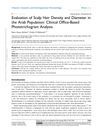18 citations,
January 2000 in “Journal of Adhesion Science and Technology” Modified artificial hair with collagen improves tissue adhesion and is safe for long-term use.
 4 citations,
January 2015 in “Journal of drug assessment”
4 citations,
January 2015 in “Journal of drug assessment” Finasteride gel effectively and safely reduces hair thickness in women with excessive hair growth.

New treatments for hair loss show promise, including plasma, stem cells, and hair-stimulating complexes, but more research is needed to fully understand them.
 April 2024 in “Cognizance journal”
April 2024 in “Cognizance journal” The alexandrite laser effectively reduces unwanted hair by about 75%.
 7 citations,
December 1984 in “The Journal of Dermatologic Surgery and Oncology”
7 citations,
December 1984 in “The Journal of Dermatologic Surgery and Oncology” Early transplantation helps avoid embarrassment and allows relaxed transplant sessions, but be cautious with young patients with thinning hair.
 October 2024 in “Cosmoderma”
October 2024 in “Cosmoderma” Proper hair care and suitable products are essential for men's scalp health and well-being.
 January 2016 in “Georg Thieme Verlag eBooks”
January 2016 in “Georg Thieme Verlag eBooks” Hair transplantation in East Asians needs special techniques to ensure natural results and prevent complications due to their unique hair and scalp characteristics.
 1 citations,
December 2022 in “Clinical, cosmetic and investigational dermatology”
1 citations,
December 2022 in “Clinical, cosmetic and investigational dermatology” Arab hair is generally thicker but less dense compared to other ethnicities, affecting hair disorder diagnosis and treatment.
 4 citations,
September 2016 in “PubMed”
4 citations,
September 2016 in “PubMed” Using platelet-rich fibrin matrix with hair transplant techniques helps in hair regrowth in male baldness patients.
136 citations,
July 2014 in “Proceedings of the National Academy of Sciences of the United States of America” FGF5 gene mutations cause unusually long eyelashes by affecting hair growth regulation.
 151 citations,
May 2014 in “American Journal of Clinical Dermatology”
151 citations,
May 2014 in “American Journal of Clinical Dermatology” Effective treatments for male pattern baldness include oral finasteride and topical minoxidil, while topical minoxidil is best for female pattern baldness.
 27 citations,
September 2018 in “Skin appendage disorders”
27 citations,
September 2018 in “Skin appendage disorders” Hair transplantation may work for some types of scarring alopecia, but results vary and more research is needed.
 27 citations,
September 2017 in “Journal of Investigative Dermatology Symposium Proceedings”
27 citations,
September 2017 in “Journal of Investigative Dermatology Symposium Proceedings” Hair loss in black women needs more research, early intervention, and community education.
 18 citations,
November 2016 in “Journal of Oral and Maxillofacial Surgery”
18 citations,
November 2016 in “Journal of Oral and Maxillofacial Surgery” Platelet-Rich Plasma (PRP) treatment can potentially increase hair density and quality in people with hair loss, but more research is needed to confirm its effectiveness.
 18 citations,
May 2016 in “Aesthetic Surgery Journal”
18 citations,
May 2016 in “Aesthetic Surgery Journal” Body hair transplantation is an effective method for restoring hair in people with severe baldness and limited scalp donor hair.
 7 citations,
February 2021 in “Legal Medicine”
7 citations,
February 2021 in “Legal Medicine” Hair analysis showed very high metformin levels in two fatal overdose cases, suggesting it's useful in forensics but sweat may affect results.
 13 citations,
June 2020 in “Stem Cells International”
13 citations,
June 2020 in “Stem Cells International” A substance from a specific gel helped to grow hair effectively in mice, suggesting it could potentially be used to treat hair loss in humans.
 10 citations,
February 2011 in “Journal der Deutschen Dermatologischen Gesellschaft”
10 citations,
February 2011 in “Journal der Deutschen Dermatologischen Gesellschaft” The document concludes that proper diagnosis and evidence-based treatments are crucial for managing hair diseases, and psychological support for patients is important.
 105 citations,
April 2004 in “Dermatologic Therapy”
105 citations,
April 2004 in “Dermatologic Therapy” The document concludes that proper diagnosis and a combination of medical, hair-care, and surgical treatments are important for managing alopecia in black women.
 February 2024 in “International Journal of Molecular Sciences”
February 2024 in “International Journal of Molecular Sciences” Hair loss in Androgenetic Alopecia is caused by genetics, aging, and lifestyle, leading to hair follicle shrinkage and related health risks.
22 citations,
April 2022 in “Stem cell research & therapy” Hair follicle-derived extracellular vesicles may help heal chronic wounds as effectively as those from adipose tissue.
 8 citations,
January 2020 in “Plastic and Aesthetic Nursing”
8 citations,
January 2020 in “Plastic and Aesthetic Nursing” The article concludes that different types of hair loss require specific treatments and psychological support is important.
 June 2024 in “Skin Health and Disease”
June 2024 in “Skin Health and Disease” Men with alopecia often feel less confident and have lower wellbeing, needing more support.
 30 citations,
October 2016 in “Current research in translational medicine”
30 citations,
October 2016 in “Current research in translational medicine” Hair follicles on the scalp interact with and respond to the nervous system, influencing their own behavior and growth.
 1 citations,
March 2018 in “Hair transplant forum international”
1 citations,
March 2018 in “Hair transplant forum international” Using one's own fat may help treat hair loss.
 187 citations,
June 1999 in “Journal of The American Academy of Dermatology”
187 citations,
June 1999 in “Journal of The American Academy of Dermatology” Finasteride effectively treats frontal hair loss with few side effects.
 1 citations,
November 2023 in “Biomaterials advances”
1 citations,
November 2023 in “Biomaterials advances” Sponges made of soy protein and β-chitin with human cells from hair or fat can speed up healing of chronic wounds.
 December 2023 in “Journal of Cosmetic Dermatology”
December 2023 in “Journal of Cosmetic Dermatology” The hair growth product was effective and safe, increasing hair growth, thickness, and density while reducing hair fall.

Kerascalp hair serum was found to be safe and effective in improving hair growth and strength in people with mild to moderate hair loss.
 21 citations,
June 2009 in “Current Medical Research and Opinion”
21 citations,
June 2009 in “Current Medical Research and Opinion” Most men with hair loss worry, try self-treatments, and delay doctor visits due to cost, uncertainty, and embarrassment.


























